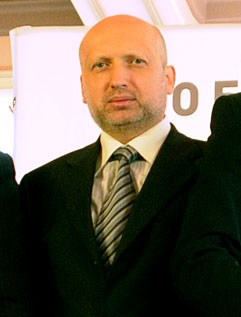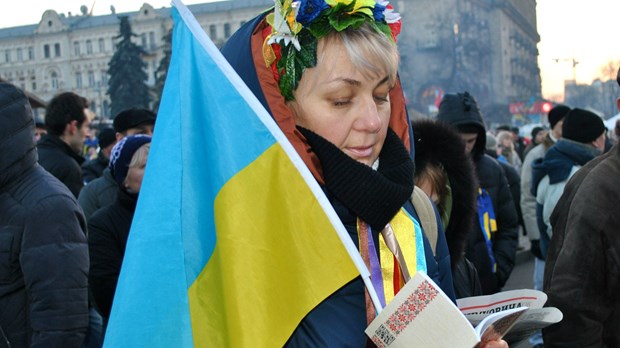Oleksandr Turchynov, a well-known Baptist pastor and top opposition
politician in Ukraine, took office on Sunday, Feb. 23, as acting
president after the Parliament voted to oust President Yanukovych.
At issue was Yanukovych's decision to move Ukraine into a much closer
economic and political relationship with Russia. This move triggered
outrage among younger Ukrainians who wish for their nation to cast its
lot with the European Union. After the vote to oust him, Yanukovych fled
Kiev and is reportedly in Crimea, an autonomous republic in southeast
Ukraine. According to media reports, the new government has charged
Yanukovych with murder and has issued a warrant for his arrest.
Monday night in Kiev, Turchynov, 49, spoke publicly for the first time
since taking office as acting president. According to an unofficial
translation, he said, "Unprecedented cruelty and brutality of the
dictatorial regime did not stop citizens. They selflessly gave their
lives to defend their rights—and won.
"Our first task today is to stop the confrontation, to regain control …
to ensure peace and tranquility, to prevent new victims, local
rivalries and lynchings. Another priority is returning to European
integration. We must return to the European family. We recognize the
importance of relations with the Russian Federation, and are ready for
dialogue with the Russian leadership to build relations with this
country on a new, truly equitable and good-neighborly basis, which
implies recognition of accounting Ukraine's European choice."
The Parliament has set new national elections for late May.
 Image: Wikicommons
Image: Wikicommons
Acting President Turchynov was elected to Parliament in 1998
The choice of a Baptist pastor as acting president in Ukraine, which
has had an Orthodox majority population for centuries, does not come as a
huge surprise to Sergey Rakhuba, head of U.S.-based Russian Ministries.
For years, he has been in periodic contact with Turchynov.
"He is well-known in political circles as a principled, honest leader,
although he was somehow always in the shadow of Yulia Tymoshenko, the
jailed prime minister who was released yesterday.
"He is well-known as a preacher who, despite his political opposition
work, preaches on a regular basis at one of the Baptist churches in
Kiev, even though security must travel with him. Overall, the
evangelical church is excited about Turchynov's sudden unanimous
appointment as acting president. Within the evangelical community, the
post-Soviet mindset exists that a true Christian cannot necessarily be a
politician. Personally I think it is great that Turchynov is calling
for unification and healing of the nation."
In 2008, Susan Wunderink reported
a substantial cover story from Ukraine about the changing role of the
nation's evangelical minority after the 2004 Orange Revolution,
exploring how Eastern Europe's most missional evangelical church was
rethinking tradition and the Great Commission.
This is not the first time that an East European nation has turned to a
Protestant to serve as president. In 1999, Macedonia selected as its
president Boris Trajkovski, a lay Methodist who served the Roma
community. Nationally, citizens referred to him as the "George W. Bush
of Macedonia."
In 2001, CT interviewed
Trajkovski at the National Prayer Breakfast in Washington. "To serve
God," he told CT, "is to be with the people and to follow Jesus' steps."
Tragically, Trajkovski was killed in a 2004 plane crash in Bosnia.
On Monday, Christianity Today was given the public statement of Valery Antonyuk, vice president of the All Ukrainian Union of Evangelical Churches, Baptist.
A Message of Reconciliation:
During this time of fateful change in the life of the Ukrainian nation, the Church and each Christian individually cannot remain spectators on the sidelines of the battles and losses. The Church serves society and mourns together with it. We went through difficult days together with the nation – we served through prayer, evangelism, volunteers, medical help, clothing, and food. Today a time has come for a ministry of active reconciliation, which will help maintain unity in our country and nation.
We supported the nation's demand to put an end to the tyranny of the authorities and repressions by the police. Now it is important to restore justice and due process of law in the country, to form a government that has the people's trust, and provide fair presidential elections. We believe that those guilty of crimes against the people will be justly judged, and that peaceful citizens will be protected.
But on behalf of the Church we must say more, we must speak the whole truth; we must say that which is still hard to accept and fulfill; that, which is a precondition for a better future.
Therefore the Church calls the Ukrainian nation to more than just feelings of human justice – to Christian forgiveness, grace, and reconciliation. We pray to God for repentance for the guilty. However at the same time we ask victims to forgive those who are already repentant as well as those who are still lost. In order to unite the nation, in order to reconcile its various parts, its various social, cultural, and political groups, laws and justice are not enough. Without repentance, grace, forgiveness and reconciliation, the country will remain divided and in conflict. This is the precondition for a deep spiritual transformation of Ukraine.
The Bible says that there is, "a time to tear and a time to mend, a time to be silent and a time to speak, a time to love and a time to hate, a time for war and a time for peace" (Ecc. 3:7-8). In accordance with these wise words, we declare today to be a time to mend, and not a time to tear the nation apart; a time to seek peace, and not a time to fan the flames of war; a time to learn to love yesterday's enemies, and not a time to continue to hate rivals and those who have hurt us.
We call on the Evangelical churches of Ukraine to serve to bring peace between people and healing to the wounds of war. We do not call black white and do not justify crimes or even mistakes. But we, as Christians, forgive, because we have been forgiven by God. He reconciled us to Himself, and gave us a message of reconciliation. This grace-giving Word to our whole nation should be heard from Lvov to Donetsk, from Kiev to Simferopol.
We also call upon the international Christian community asking for prayer and intercession for the Ukrainian nation and for help with peacemaking. We mourn for the victims, and thank God for His grace toward Ukraine, and pray for peace and spiritual revival in our nation.



No comments:
Post a Comment